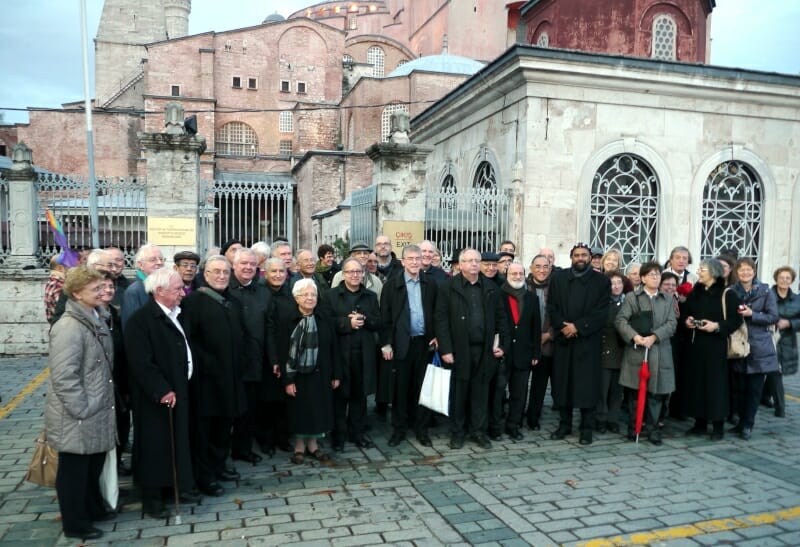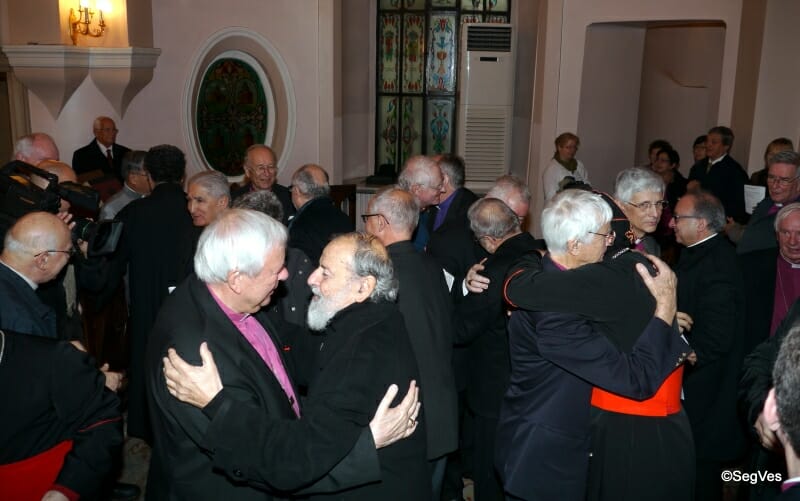
© CSC Audiovisivi – R. Meier
The course of the
34th convention of Bishops of various churches promoted by the Focolare, is heading towards solid ground. A rainy and gloomy day saw the relocation from the Monastery of Halki towards Chalcedon. It took an hour by boat to reach Kadikoy, Istanbul, the old Bithynia where the 4
th Ecumenical Council took place in 451. The group of 35 bishops of 16 churches were welcomed in the Church of Christ the King, which is in charge of a vast area with a population of 3,000 people of the local Armenian community. The parish priest explained why the Council of Chalcedon was held, not far from this Church.
They had to discuss a fundamental issue for Christianity regarding the human and divine nature of Christ. Since the pre-council fathers could not reach an agreement, they entrusted the resolution to the Holy Spirit, which the people in the East perceive as a feminine being. Such a significant and historical site is a source of inspiration in comprehending the “journey toward unity in diversity” – which, as
Cardinal Francis Kriengsak explained – is at times difficult and painful, but if we remain faithful, can generate fruits for centuries to come.».

© CSC Audiovisivi – R. Meier
As tradition would have it, these bishop conventions are followed by
a solemn pact of mutual love amongst all present, with the promise to “be ready to give one’s life for the others” according to the commandment of Jesus “love one another as I have loved you.” This inspirational motto was accompanied by the reading of the words of Patriarch Athenagoras: «If we disarm ourselves, if we strip ourselves of all things, if we open out to God-man who makes all things new, it is then that He can cancel the evils of the past and restore a new era where all things are possible. »
Before a Marian icon, each bishop signed the pact. «The pact of mutual love between bishops of various churches – explained Brendan Leahy, Catholic Bishop of Limerick, Ireland –is a constant reminder to open out and not lock myself up in my diocese. It means avoiding superficiality in order to get to the roots of our being Christians and bishops.» Michael Grabow, Lutheran bishop of Augsburg said «it is a commitment to live the radicalism of love and a reminder that if we belong to different churches, we are brothers and sisters.» Geoffrey Rowell, Anglican bishop and theologian from England, recalled «we are united by the same pact also with the Orthodox bishops who were kidnapped in Aleppo, Syria, and of whom we have not received any news. While the media has forgotten, we always remember them since we are bound by a common fraternity.» Theophilose Kuriakose, the Indian Metropolitan bishop of the Coptic-Orthodox Syrian Church commented – we listen to many people in order to solve their problems, but at times we feel lonely because no one is there to listen to our own problems. We need to feel the unity and brotherhood that bind us, of course without falling short of our communion with God and our choice of Jesus crucified and abandoned. This pact will be sealed in my heart and gives me strength and makes me feel also responsible in communion with others.». Written by : Aurelio Molè
0 Comments